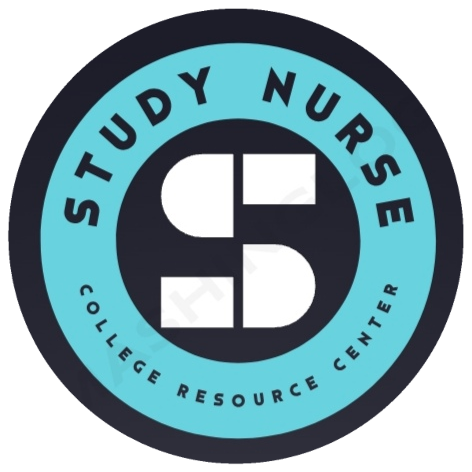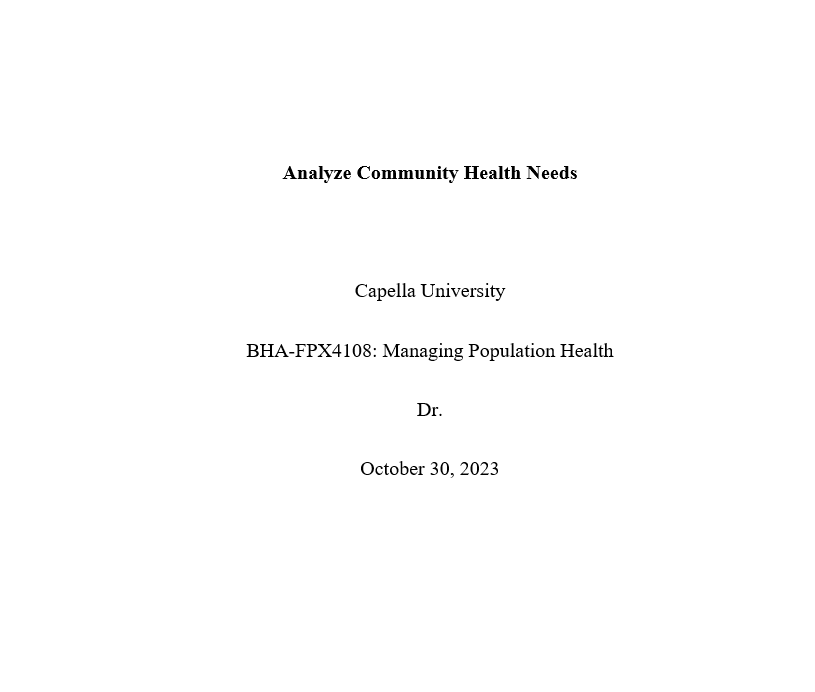Capella University
BHA-FPX4108: Managing Population Health
Dr.
October 30, 2023
Analyze Community Health Needs
Communities play key roles at the local, state, and national levels. The presence of community health centers, healthcare organizations, and other stakeholders reinforces the collective commitment to improving the overall health of residents. Owensboro is among the communities that create opportunities to thrive socially and economically. This paper describes the health improvement needs of the community based on epidemiological information.
Salient Characteristics That Define a Community
Owensboro is in western Kentucky. The region has a population of 59,796 people and a median age of 38.4. Young adults and residents between 60-69 years form the majority of the population (Census Bureau, 2020). For instance, 14% are between 20-29 years. Similarly, 13% of the population represent older adults between 60-69 years. Whites dominate the population with 83% followed by African Americans at 6% and Asian Americans at 2%. Owensboro has a per capita income of $27,780 and a median household income of $46,193. A larger population (54%) has a household income below $50,000 (Census Bureau, 2020).
Further, 20.5% of residents live below the poverty line with an income of about $11,844. Children and seniors are the most affected by the worrying poverty rates. Further, personal cars and carpooling dominate the mode of transportation at 84% and 9% respectively (Census Bureau, 2020). Geographically, Owensboro has a scenic environment makes the community a major attraction point for those planning a visit to an art museum or a distillery tour. Residents and visitors can enjoy waterfront strolls and picturesque views. The community is also appropriate for individuals looking to invest in a fun urban setting due to several local parks and opportunities to stay healthy and enjoy nature.
Health Improvement Needs Of a Community
The health improvement needs of the Owensboro community include mental health, diabetes, and adult obesity. Mental health is a serious concern due to stigma that undermines access to behavioral and mental health services. Overweight/obesity is the second health challenge with 18% of households affected by the condition. Diabetes follows with 14% while 12% of the households face mental health issues (Owensboro Health Muhlenberg Community Hospital, 2021).
Poor eating habits, inadequate physical exercise, and alcohol abuse are some of the risky behaviors that increase the prevalence of mental illnesses, diabetes, and adult obesity (Owensboro Health Muhlenberg Community Hospital, 2021). Thus, health improvement needs portray the need for the community to focus more on adopting comprehensive care plans including mental health options, access to specialists, and counseling services accessible by households. More support groups for diabetes and mental health issues are necessary to ensure that more people get help within the appropriate time.
Engagement of Community Stakeholders
Community stakeholders include the local government, community agencies, healthcare organizations such as Owensboro Health Muhlenberg Community Hospital, and wellness centers. The identified stakeholders help the community address the three health needs identified. For instance, Owensboro Health Muhlenberg Community Hospital collaborates with citizens to initiate community walks and runs to address adult obesity (Owensboro Health Muhlenberg Community Hospital, 2021).
Similarly, Owensboro Health Healthpark collaborates with schools, families, and employers to provide free health assessment and educate on healthy food, beverage choices, and physical activities for preventing obesity. Owensboro Health Regional Hospital is among the stakeholders playing crucial roles in increasing depression screenings and access to inpatient services for residents battling mental health issues (Owensboro Health Muhlenberg Community Hospital, 2021). The facility coordinates with Pennyroyal Mental Health Center to enhance access to behavioral health services and educational sessions for preventing self-harm such as suicide.
Additionally, Owensboro’s local public health department plays key roles in developing and operating health programs and activities. The stakeholder strives to improve the health and safety of residents through prevention, promotion, and protection. For instance, the local public health department promotes healthy lifestyles such as exercise and proper eating habits. Programs such as tobacco and smoking cessation, supplemental nutrition for women and children, and public health preparedness makes the stakeholder crucial for a healthy and productive Owensboro community.
Owensboro community steering committees brainstorm on resource mobilization, allocation, and utilization to strengthen the quality of prevention, promotion, and treatment programs (Owensboro Health Muhlenberg Community Hospital, 2021). The community also gains from focus groups that provide input on the state of health in the region and interventions necessary to overcome mental health, obesity, and tobacco use addiction. One barrier is the busy nature of residents, which makes it challenging to scale promotion and optimize health promotion and education programs. Negative health seeking behaviors and an unhealthy eating culture make it challenging for educators to produce meaningful gains within a shorter duration (Owensboro Health Muhlenberg Community Hospital, 2021). However, increased complications and mortality associated with unhealthy habits make more residents aware of the need for proactive involvement in health promotion and education.
Treatment or Wellness Models Used To Address an Identified Community Health Need
Cognitive behavioral therapy (CBT) is the preferred treatment model for handling depression across the community. The intervention empowers individuals to modify thought patterns to help change moods and behaviors. Blending cognitive and behavioral therapies enables patients to adopt positive thoughts, feelings, actions, and behaviors that help them manage depressive symptoms (Bhat, 2017). Patients and therapists work to identify approaches to challenging and stressful situations. The goal is to empower patients to have a balanced and constructive way of responding to depressive symptoms. Further, patients can embrace meditation and journaling to manage heightened anxiety and other undesirable signs associated with depression and other mental illnesses (Bhat, 2017).
With about 5 to 20 sessions, individuals can discover sources of stressors, learn to manage distorted thoughts and reactions, and respond appropriately. Practicing the coping skills personally and with therapists improve one’s moods, beliefs about themselves, and overall outlook on life. One drawback of CBT is that attending regular sessions takes up a lot of a patient’s time. The busy nature of Owensboro adults may discourage them from participating in CBT sessions or carrying out extra work between sessions. A complex CBT session may be unsuitable for residents with escalated mental health issues and learning difficulties (Bhat, 2017). The intervention focuses more on an individual’s ability to change their thoughts, feelings, and behaviors. However, the model does not address wider issues such as family conflicts that have adverse impacts on one’s health and well-being.
The prevention model is the Health Belief model that guides overweight and obesity management. The concept enables healthcare providers to explain and predict changes in eating habits, physical activities, and alcohol use. In this case, community members at risk or affected by obesity embrace short and long-term interventions that highlight recommended actions and the benefits of successful behavior changes (Rural Health Information Hub, 2022).
For instance, the Health Belief model conveys the consequences of being overweight and obese and communicates to the target population practices necessary to improve quality of life. The audience can access evidence-based information on healthier foods such as fruits and vegetables, whole grains, and protein sources appropriate for preventing obesity. Similarly, individuals access information on unhealthy options such as red meat, sweets, processed meat, limited physical activity, and excess screen time that expose them to adverse health outcomes. However, the model does not consider habitual behaviors associated with mental health issues, tobacco use addiction, diabetes, obesity, and other issues (Shitu et al., 2022). The theory also fails to consider behaviors such as social accessibility and peer pressure. Considering non-health related reasons helps stakeholders develop a comprehensive understanding of social, environmental, and cultural aspects associated with unhealthy behaviors.
Conclusion
The key stakeholders in Owensboro include healthcare organizations, community leaders, and community-based organizations. The groups help improve individual and population health. The various parties understand the health burden and implications on households. Such awareness reinforces calls for evidence-based treatment and prevention models to improve healthcare outcomes. For a community like Owensboro, stakeholder engagement can enhance response to social and economic threats posed by diabetes, obesity, and mental health issues.
References
Bhat, S. A. (2017). Cognitive behavioral therapy and depression. International Journal of Advanced Educational Research, 2(6), 143-145. https://www.researchgate.net/publication/322331361_Cognitive_behavioral_therapy_and_depression
Owensboro Health Muhlenberg Community Hospital. (2021). Community health needs assessment 2021. Owensboro Health Muhlenberg Community Hospital. https://www.owensborohealth.org/sites/default/files/inline/d0/ohmch-community-health-needs-assessment-2021.pdf
Rural Health Information Hub. (2022). The health belief model. Rural Health Information Hub. https://www.ruralhealthinfo.org/toolkits/health-promotion/2/theories-and-models/health-belief
Shitu, K., Adugna, A., Kassie, A., & Handebo, S. (2022). Application of Health Belief Model for the assessment of COVID-19 preventive behavior and its determinants among students: A structural equation modeling analysis. PLoS ONE, 17(3), 1-11. https://journals.plos.org/plosone/article?id=10.1371/journal.pone.0263568
U.S. Census Bureau (2020). American Community Survey 5-year estimates. http://censusreporter.org/profiles/16000US2158620-owensboro-ky/

